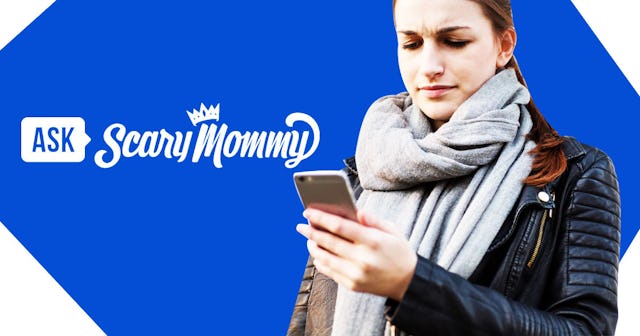Ask Scary Mommy: Social Media Is Playing A Huge Role In My 2020 Depression

Ask Scary Mommy is Scary Mommy’s advice column, where our team of “experts” answers all the questions you have about life, love, body image, friends, parenting, and anything else that’s confusing you.
This week — is social media increasing your 2020 depression? Should you just delete all apps and throw your phone out the window, or is there a way to navigate it in a healthy way? Have your own questions? Email advice@scarymommy.com
Dear Scary Mommy,
I’m someone who has always used social media for fun, for work, and to catch up on anything from current events to someone’s new dog. This year, and the last four or five years if I’m being honest, social media seems like such a dark place. While there’s definitely an increase in political posts and opinions and memes, that’s not the crappy part. What I’m struggling with is seeing people I had always respected or assumed were normal, happy, loving people share endless conspiracy theories, propaganda, hateful Trump rhetoric, and general misinformation while getting SUPER defensive when they’re corrected. People in my family, friends I’ve known forever, etc. Watching people enjoy large gatherings and parties and post them like everything is fine is really hard too, because my family is missing out on things like that to stay safe. Should I just delete it all and become a social media hermit?
There’s a direct link between social media use and anxiety and depression, and 2020 isn’t the only reason why. But it’s definitely made things worse. Particularly in relation to the pandemic. Excessive social media use during the pandemic is a predictor of symptoms of depression and secondary trauma, according to a study by researchers at Pennsylvania State University and Jinan University in China.
The research shows that more people are relying on social media to find and share health news during the crisis. Between late March and early May, 46% to 51% of American adults reported using social media more often than before the pandemic. And it affected those who had always struggled with mental health issues and those who had never experienced them before, too.
The study found more than half of participants, none of whom reported any traumatic or depressive disorders before the pandemic, experienced some level of depression. Nearly 20% of participants reported experiencing a moderate to severe level of depression, and slightly more than 20% reported moderate to severe levels of secondary trauma, which can occur when people hear about the traumatic experiences of others.
Basically, it’s rough out there. We think we gravitate toward social media to connect with others, but it doesn’t always work out positively in our favor. Particularly when your beloved Aunt Sue is sharing QAnon garbage that accuses Democrats of drinking baby blood or your best friend from third grade is posting photos of herself, maskless, in a backyard pool party.
I sometimes just want to delete every single app that does not bring me joy and never look back, but then I’d probably be out of a job faster than I’d be out of the loop. And if being in a bubble of oblivion is something you want to try for a while, do it. If that doesn’t work out or isn’t sustainable, then increasing your boundaries is the next step. Social media boundaries give you control over who you give access to your photos, updates, and your life — and, in turn, who’s lives you want access to. From snoozing and unfollowing to unfriending and blocking, you have control over all of it. And exercising control alleviates anxiety.
2020 has given us plenty of reasons to feel defeated and disappointed in other people. Sometimes it’s beneficial to be able to weed out people with harmful rhetoric who are inconsequential to your life. Sometimes it hurts to see people you love participating in irresponsible behavior. But you get to choose what you see, and who sees you. Remember that.